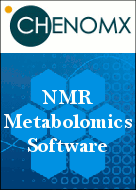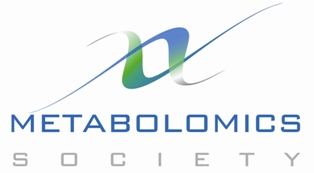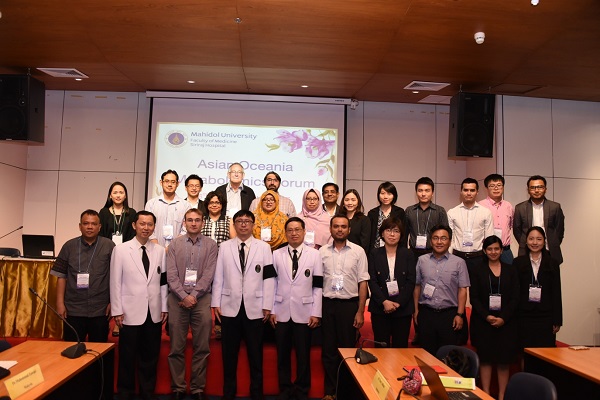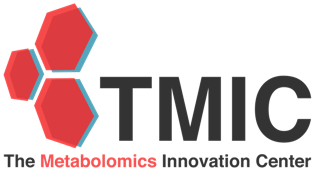12-13 Oct
2017
|
Quality
Assurance and
Quality
Control in
Metabolomics
Venue:
Birmingham
Metabolomics
Training
Centre, School
of
Biosciences,
University of
Birmingham,
Birmingham, UK
This two-day
course will
provide a
comprehensive
overview of
the
application of
quality
assurance (QA)
and quality
control (QC)
in metabolic
phenotyping.
The course is
aimed at
students and
researchers
who are
actively
working in the
field. Experts
who have
developed the
application of
QA and QC
procedures
within the
field will
lead the
course. It
will include
both
theoretical
and practical
components to:
- Introduce
QA and QC in
metabolic
phenotyping
- The
application of
QA and QC in
untargeted and
targeted
studies
- Preparation
of QCs and
data
acquisition
- Data
processing and
reporting
standards
The course
will finish
with a
question and
answer session
with a panel
of experts.
Bursaries are
now available
for PhD
students
funded by the
BBSRC, MRC, or
NERC.
For further
information
and
registration
details,
please visit http://www.birmingham.ac.uk/facilities/metabolomics-training-centre/courses/quality-phenotyping.aspx
or contact bmtc@contacts.bham.ac.uk.
|
12-13 Oct
2017
|
Mayo
Clinic
Metabolomics
Symposium
Venue:
Leighton
Auditorium,
Siebens
Building, Mayo
Clinic, Rochester,
Minnesota, USA
Register
today for the
Mayo
Clinic
Metabolomics
Symposium
October 12-13,
2017 –
Siebens
Building,
Leighton
Auditorium,
Rochester,
Minnesota.
Featured
speakers
include Mayo
Clinic experts
and:
- Dr. David
Wishart,
University of
Alberta,
Canada
- Dr. Daniel
Raftery,
University of
Washington
- Dr. Thomas
Caskey, Baylor
College of
Medicine
- Dr. David
Pagliarini,
University of
Wisconsin,
Madison
- Dr. Clary
Clish, Broad
Institute of
MIT and
Harvard
University
Metabolomics
2017 Symposium
Agenda
Registration
links:
Mayo
Clinic
Metabolomics
Symposium
*You will be
required to
create a
profile.
Speakers and
vendors do not
need to
register.
Mayo
Clinic
Optional
Focused 4-hour
Workshop
Friday,
afternoon,
October 13
(limited
availability,
not open to
Mayo Clinic
Employees)
Cost:
$50 Course
Registration –
Mayo Clinic
Employee
$150 Course
Registration –
Scholar/Junior
Faculty
$275 Course
Registration -
Standard
$100 Optional
Hands-on –
Limited
Attendee
Workshop
Attendees are
invited to
display
posters at the
conference
reception on
Thursday
evening.
Awards for
excellence
will be given
to first place
($300), second
place ($200)
and third
place
($100).
Vendor
opportunities
are available
and will be
displayed
during the
entire
workshop as
well. Please
contact Jacquelyn
Gosse for
vendor
information.
Mayo
Clinic is
one of six
federally
funded
Regional
Comprehensive
Metabolomics
Resource Cores
(RCMRC) to
support
medical
research using
metabolomics -
the
comprehensive
and
quantitative
analysis of
molecules
(metabolites)
that define
the metabolic
signatures of
living
systems. This
symposium was
made possible
through grant
number
U24DK100469
from the
National
Institute of
Diabetes and
Digestive and
Kidney
Diseases and
originates
from the
National
Institutes of
Health
Director’s
Common Fund.
For more
information,
contact Jacquelyn
Gosse.
|
18-20 Oct
2017
|
Workshop
in Environmental
Omics,
Integration
and Modelling
Venue:
CosmoCaixa,
Barcelona,
Spain
The aim of
this workshop
is to review
the
state-of-the-art
and broaden
the knowledge
on
high-throughput
analytical
methods, data
integration
and modelling
in
Environmental
Omics and
Toxicology.
The main
workshop
topics will be
the following:
- Transcriptomic
and Genomic
studies
- Metabolomic
and Lipidomic
studies
- Development
of
Chemometrics
and Analytical
Tools
- Data
Integration
and Modelling
We are pleased
to invite you
to participate
in this
workshop that
will promote
knowledge
exchange and
creation of
new
relationships
and future
collaborations.
For more
information,
please visit http://wenvomics2017.info/.
|
24 Oct
2017
|
EMN
Webinar “Using
PhenoMeNal for
your
metabolomics
data analysis
on the cloud”
Venue: Online
For
further
details,
please contact
the PhenoMeNal
team members
at http://phenomenal-h2020.eu/home/help/.
|
30 Oct-3
Nov 2017
|
Hands-on
targeted and
untargeted
LC-MS
metabolomics
Venue: Aarhus
University,
Tjele,
Denmark
PhD
course at
Department of
Animal
Science:
Hands-on
targeted and
untargeted
LC-MS
metabolomics
with emphasis
on measuring
phytochemicals
in plasma and
urine
Level of
course:
Master, PhD
and Postdoc
For further
information
and
registration
details,
please visit http://anis.au.dk/uddannelse/hands-on-targeted-and-untargeted-lc-ms-metabolomics/.
|
6-8 Nov
2017
|
Metabolomics
with the Q
Exactive
Venue: Birmingham
Metabolomics
Training
Centre, School
of
Biosciences,
University of
Birmingham,
Birmingham, UK
This three-day
course will
introduce you
to using the Q
Exactive mass
spectrometer
in your
metabolomics
investigations.
The course is
aimed at
students and
researchers
with minimal
previous
experience of
applying LC-MS
in
metabolomics.
The course
will be led by
experts in the
field and
include
lectures,
laboratory
sessions and
computer
workshops to
provide:
- An
introduction
to
metabolomics
and using the
Q Exactive
mass
spectrometer
in your
studies
- Polar and
non-polar
sample
preparation
for profiling
and targeted
studies
- Data
acquisition
for profiling
and targeted
studies
- Data
processing and
data analysis
- Introduction
to metabolite
identification
The course
will finish
with a
question and
answer session
with a panel
of experts.
Bursaries are
now available
for PhD
students
funded by the
BBSRC, MRC, or
NERC.
For further
information
and
registration
details,
please visit http://www.birmingham.ac.uk/facilities/metabolomics-training-centre/courses/q-exactive.aspx
or contact bmtc@contacts.bham.ac.uk.
|
7-10 Nov
2017
|
Hands
on Data
Analysis for
Metabolic
Profiling
Venue: Imperial
International
Phenome
Training
Centre,
Imperial
College London,
UK
Earlybird:
£900
Standard:
£1100
This 4-day
course
provides a
comprehensive
overview of
data analysis
for metabolic
profiling
studies with
data acquired
from NMR
spectroscopy
and Liquid
Chromatography-Mass
Spectrometry.
It combines
lectures and
tutorial
sessions to
ensure a
thorough
understanding
of the theory
and practical
applications.
Day 1:
Introductory
lectures and
tutorials
regarding the
pre-processing
of data
acquired via
NMR and LC-MS.
Day 2:
Lectures and
tutorials
introducing
exploratory
chemometrics
approaches,
including PCA.
Day 3:
Lectures and
tutorials
covering
advanced
chemometrics
techniques
including PLS
and Orthogonal
PLS.
Day 4: The
next step -
computational
tools to aid
metabolite
identification
and pathway
analysis.
For more
information,
visit http://www.imperial.ac.uk/imperial-international-phenome-training-centre/courses/hands-on-data-analysis-for-metabolic-profiling/.
|
13-17 Nov
2017
|
Hands-on
LC-MS for
Metabolic
Profiling
Venue: Imperial
International
Phenome
Training
Centre,
Imperial
College London,
UK
Earlybird:
£1750
Standard:
£1950
This week long
course covers
how to perform
a metabolic
profiling
experiment
from start to
finish. It
will cover
study design,
sample
preparation,
the use of
mass
spectrometry
for global
profiling,
targeted
methodologies
and data
analysis.
Day 1:
Introductory
lectures in
mass
spectrometry
and
chromatography,
study design
and sample
preparation,
followed by
preparation of
biological
samples for
analysis on
subsequent
days.
Days 2 and 3:
Analysis of
biofluids
through global
profiling and
targeted
analyses; an
introductory
session to
liquid
chromatography,
followed by
sessions on
each of the
newest QToF
and TQ
instrumentation.
Instrument set
up, method
development
and
acquisition
will be
covered. We
have set a
maximum of 3
attendees per
instrument
allowing for
hands-on
participation
by all.
Day 3 finishes
with
introduction
to data
analysis.
Day 4: Data
analysis
workshops
where
attendees will
process the
data acquired
from the
previous days,
mixed with
further
statistics
lectures,
allowing for
development of
interpretation
skills.
Day 5:
Application
lectures,
tips, tricks
and
troubleshooting,
optional trip
to the
MRC-NIHR
National
Phenome
Centre.
For further
information,
please visit http://www.imperial.ac.uk/imperial-international-phenome-training-centre/courses/hands-on-lc-ms-for-metabolic-profiling/.
|
20-27 Nov
2017
|
2nd
International
Electronic
Conference of
Metabolomics (IECM-2)
Venue: Held
online
Building in
the success of
the 1st
International
Electronic
Conference of
Metabolomics (IECM-1) in 2016, Metabolites
(ISSN
2218-1989), a
peer-reviewed,
scientific
journal,
edited by MDPI
AG, is proud
to be the
organizer and
sponsor of the
second
International
Electronic
Conference on
Metabolomics.
Contributions
dealing with
any discipline
promoting metabolism
and
metabolomics
will be
welcomed.
The conference
will be held
online (http://sciforum.net/conference/iecm-2)
from 20–27
November 2017,
enabling you
to present
your latest
research to
the scientific
community and
to have the
opportunity to
participate in
fruitful
exchanges of
information
with academic
and industrial
groups from
all over the
world. It is absolutely
free of charge
to participate
as an author
or a visitor;
all you need
to do is
create an
account on the
home page.
After the
event,
proceedings
from the
conference
(abstracts)
will be
published in
the online
open access
journal, Proceedings.
On behalf of
our active
scientific
committee and
dynamic
editorial
staff, we
warmly invite
you to join us
at the second
International
Electronic
Conference on
Metabolomics
and we look
forward to
posting your
contribution.
Sincerely
yours,
A/Prof
Peter J Meikle
Chair of the
2nd
International
Electronic
Conference on
Metabolomics
Editor-in-Chief
of Metabolites
(ISSN
2218-1989)
NHMRC Senior
Research
Fellow
Program Head,
Metabolism
Head,
Metabolomics
Laboratory
Baker IDI
Heart and
Diabetes
Institute
75 Commercial
Road,
Melbourne VIC
3004
E-Mail: peter.meikle@bakeridi.edu.au
Website: www.bakeridi.edu.au
For further
information,
please visit http://sciforum.net/conference/iecm-2.
|
1 Dec
2017
|
Introduction
to
Metabolomics
for the
Clinical
Scientist
Venue: Birmingham
Metabolomics
Training
Centre, School
of
Biosciences,
University of
Birmingham,
Birmingham, UK
This one-day
course in
partnership
with the
Phenome Centre
Birmingham
will provide
clinicians
with an
overview of
the
metabolomics
pipeline,
highlighting
the benefits
of the
technique to
the medical
field. The
course will
provide an:
- Introduction
to
experimental
design and
sample
collection
- An
overview of
both the
analytical and
computational
methods
applied in the
field
- Case
studies and
panel
discussions
with the
experts
Bursaries are
now available
for PhD
students
funded by the
BBSRC, MRC, or
NERC.
For further
information
and
registrations
details,
please visit http://www.birmingham.ac.uk/facilities/metabolomics-training-centre/courses/introduction-metabolomics.aspx
or contact bmtc@contacts.bham.ac.uk.
|
6-8 Dec
2017
|
Multiple
biofluid and
tissue types,
from sample
preparation to
analysis
strategies for
metabolomics
Venue: Birmingham
Metabolomics
Training
Centre, School
of
Biosciences,
University of
Birmingham,
Birmingham, UK
This 3-day
course will
provide a
comprehensive
overview of
dealing with
complex
biological
samples for
LC-MS
analysis. The
course is
targeted
towards
students and
researchers
who are
actively
applying
metabolomics
in their
research. The
course will be
led by experts
in the field
and include:
- An
overview of
quenching and
extraction
strategies for
different
biological
samples
- Hands-on
sample
preparation
using
different
sample types
- Hands-on
HILIC and
reversed phase
LC-MS data
acquisition
- Solid
phase
extraction
clean up
methods
- An
overview of
data analysis
and metabolite
identification
- An
opportunity to
ask questions
and seek
advice to
prepare
samples in
your own
research
Bursaries are
now available
for PhD
students
funded by the
BBSRC, MRC, or
NERC.
For further
information
and
registration
details,
please visit http://www.birmingham.ac.uk/facilities/metabolomics-training-centre/courses/sample-analysis.aspx
or contact bmtc@contacts.bham.ac.uk.
|
11-13 Dec
2017
|
MetaboMeeting
2017
Venue: University
of Birmingham,
UK
Make plans to
attend the 10th
successful
MetaboMeeting
conference.
The meeting
will bring
together
research
scientists and
practitioners
from all areas
of application
and
development of
metabolic
profiling,
covering a
wide range of
experience
from early
career
scientists to
experts from
throughout the
international
metabolomics
field.
MetaboMeeting
2017 continues
to highlight
the work of
its attendees
through both
oral platform
presentation
and poster
sessions.
The deadline
for oral
presentation
abstracts is
15th
July 2017.
The deadline
for poster
abstracts is 1st
October 2017.
For further
information,
visit http://metabomeeting2017.thempf.org/.
|
14 Dec
2017
|
Free
Practical
Course -
PhenoMeNal
e-infrastructure:
taking
metabolomics
data
processing and
analysis to
the cloud
Venue: University
of Birmingham,
UK
No
registration
cost. Register
here.
|
14-15 Dec
2017
|
Metabolite
identification
with the Q
Exactive and
LTQ Orbitrap
Venue: Birmingham
Metabolomics
Training
Centre, School
of
Biosciences,
University of
Birmingham,
Birmingham, UK
This two-day
course will
provide a
hands-on
approach to
teach the
latest
techniques and
tools
available to
perform
metabolite
identification.
We will apply
these tools on
the Q Exactive
and LTQ
Orbitrap mass
spectrometry
family. The
course is
targeted
towards
students and
researchers
who are
actively
applying
metabolomics.
The course
will be led by
experts in the
field and
include
significant
hands-on
experience
using both the
Q Exactive and
LTQ Orbitrap
instruments to
perform:
- Data
dependent
acquisition
- Data
independent
acquisition
- MS/MS and
MSn
data
acquisition
The course
will finish
with a session
on the tips
and tricks
from the
experts and an
opportunity to
ask questions.
Bursaries are
now available
for PhD
students
funded by the
BBSRC, MRC, or
NERC.
For further
information
and
registration
details,
please visit http://www.birmingham.ac.uk/facilities/metabolomics-training-centre/courses/metabolite-identification.aspx
or contact bmtc@contacts.bham.ac.uk.
|
Late 2017
(To be
confirmed)
|
Metabolic
Phenotyping in
Disease
Diagnosis and
Personalised
Health Care
Venue: Imperial
International
Phenome
Training
Centre,
Imperial
College London,
UK
Students: £500
Academic: £800
Industry:
£1150
A lecture
based course
detailing an
overview of
metabolic
phenotyping
including the
use of NMR
spectroscopy
and Mass
Spectrometry,
with insights
from the
experts at
Imperial
College and
collaborators
from all over
the world.
Lectures will
cover data
acquisition
and analysis
with some
advanced
statistical
workshops for
more hands-on
participation
for attendees.
There will
also be
examples of
real life
applications
from the
research at
Imperial
College and
their
collaborators.
Day 1:
Registration
followed by
session 1
which will
cover an
analytical
technology
(either NMR or
MS) for
metabolic
profiling. A
laboratory
tour of the
facilities
will follow.
Day 2: Session
2 will cover
the
alternative
analytical
technique (NMR
/ MS) and will
be followed by
session 3
which will
introduce the
theory to
statistical
analysis.
Day 3: Session
4 covers more
advanced
chemometrics,
such as OPLS
and O2PLS and
includes
hands-on
workshops.
Session 5 will
introduce
metabolite
identification
in both NMR
and MS and
cover some
tips and
tricks to
avoid common
pitfalls.
Day 4: The
final day will
cover some of
the real life
applications
of NMR and MS
for metabolic
phenotyping.
For further
information,
please visit http://www.imperial.ac.uk/imperial-international-phenome-training-centre/courses/metabolic-phenotyping-in-disease-diagnosis-and-personalised-health-care/.
|
8 Jan
2018
|
Metabolomics
in Life
Sciences
Learn about
metabolomics
principles and
their
applications
in life
sciences
Venue: Osaka
University
About
this course
This
course is an
introduction
to
metabolomics
principles and
their
applications
in various
fields of life
sciences.
We will
provide a
summary of all
steps in
metabolomics
research; from
experimental
design, sample
preparation,
analytical
procedures, to
data analysis.
The course
also provides
case studies
of various
kinds of
research
samples to
attract
students that
are not
familiar with
metabolomics,
providing them
enough
explanation to
utilize
metabolomics
technology for
their
respective
research
fields.
Several
examples of
metabolomics
applications
will be
introduced
throughout the
lectures.
These include
examples
within food
science and
technology,
metabolic
engineering,
basic biology,
introduction
to imaging
mass
spectrometry,
and
application in
medical
science.
No previous
knowledge on
metabolomics
is needed but
we recommend
that students
have an
undergraduate-level
understanding
of
Biochemistry,
Analytical
Chemistry, and
Biostatistics,
and that they
learn about
basic
principles of
multivariable
analysis prior
to taking this
course.
For further
information,
please visit https://www.edx.org/course/metabolomics-life-sciences-osakaux-metab101x.
|
5-9 Feb
2018
|
EMBO
Practical
Course on
Metabolomics
Bioinformatics
for Life
Scientists
Venue: European
Bioinformatics
Institute
(EMBL-EBI) -
Wellcome
Genome Campus,
Hinxton,
Cambridge,
CB10 1SD, UK
Application
opens: Friday
August 04 2017
Application
deadline:
Friday
November 03
2017
Participation:
Open
application
with selection
Contact: Emily
Rees
Registration
fee: £350
including
accommodation
& food
Apply
now
Overview
This course
will provide
an overview of
key issues
that affect
metabolomics
studies,
handling
datasets and
procedures for
the analysis
of
metabolomics
data using
bioinformatics
tools. It will
be delivered
using a
mixture of
lectures,
computer-based
practical
sessions and
interactive
discussions.
The course
will provide a
platform for
discussion of
the key
questions and
challenges in
the field of
metabolomics,
from study
design to
metabolite
identification.
Audience
This course is
aimed at PhD
students,
post-docs and
researchers
with at least
one to two
years of
experience in
the field of
metabolomics
who are
seeking to
improve their
skills in
metabolomics
data analysis.
Participants
ideally must
have working
experience
using R
(including a
basic
understanding
of the syntax
and ability to
manipulate
objects).
For further
information,
please visit https://www.ebi.ac.uk/training/events/2018/embo-practical-course-metabolomics-bioinformatics-life-scientists-4.
|














